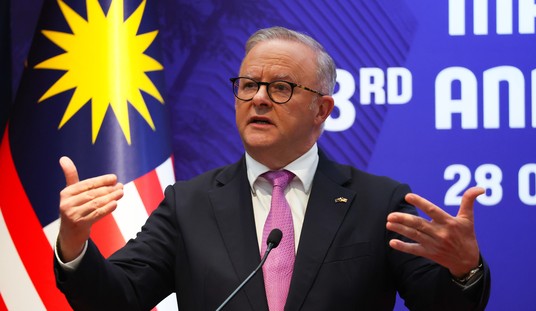The case of the Russian spies seems like such a quaint anachronism that it’s easy to dismiss out of hand. The Associated Press report today on the femme fatale of the ring, a 28-year-old woman using the name Anne Chapman, doesn’t help readers take it much more seriously. The AP has a picture of Chapman from a Russian alumni website with her dressed as a princess, and her rather public profile in the US suggests that she may never have lost that attitude:
Anna Chapman has been called the femme fatale of a spy case with Cold War-style intrigue — a striking redhead and self-styled entrepreneur who dabbled in real estate and mused on her Facebook page, “if you can dream, you can become it.”
Chapman’s American dream, U.S. authorities say, was a ruse.
The 28-year-old Chapman, they say, was a savvy Russian secret agent who worked with a network of other operatives before an FBIundercover agent lured her into an elaborate trap at a coffee shop in lower Manhattan.
Though the U.S. has branded the operatives as living covertly, at least in Chapman’s case, she had taken care to brand herself publicly as a striver of the digital age, passionately embracing online social networking by posting information and images of herself for the world to see.
Prosecutors have charged Chapman and 10 other suspects with following orders by Russian intelligence to become “Americanized” enough to infiltrate “policymaking circles” and feed information back to Moscow.
If Russia’s intelligence agencies think that building a Facebook page is the best way for its agents to remain covert, we have nothing much to fear from this spy ring. Apparently, the FBI agrees. According to this article, the FBI had been tracking the sleepers for years, only arresting them when they attempted to leave the US. Until then, the US was happy to allow them to operate, probably because they had made themselves obvious, and arresting them would only require Russia to replace them with others and force the FBI to track them down.
Interestingly, none of them have been charged with espionage, which would carry severe sentences on conviction. Instead, they’ve been charged with operating as foreign agents without registering, which carries a maximum of five years. If that remains their most serious charge (one man got arrested in Cyprus for money laundering, which carries a potentially longer term), it would seem to indicate that this ring didn’t end up with anything valuable to transmit back to Moscow.
The exposure of Russian spies should not surprise anyone. The Cold War may be 20 years gone, but Russian espionage predated the Cold War. Besides, nations want and need intelligence on their friends and quasi-friends as well as their enemies. Anyone who thinks we don’t have intelligence assets in Russia at this moment is utterly naive. We may even have sleepers in Russia, but if we do, let’s hope that they’re not on the Russian equivalent of MySpace.
Update: You know, nothing says covert like making videos in Russian while in NYC for a Russian social-networking site:
I don’t speak Russian, but I’m pretty sure I heard “squirrel” and “moose” somewhere in there.
Update II: Chuck DeVore’s not happy with Barack Obama on this issue:
Which brings us back to the President’s reaction about the arrests of the Russian agents: “Not happy.” “Not happy” that the FBI is doing its job? “Not happy” that the arrests were made only days after President Obama had an “upbeat meeting” with the Russian president, Dmitri A. Medvedev? Both explanations betray an American President more concerned with the optics of “resetting” U.S.-Russian relations than with the manifold reasons why this relationship has been, and will remain, difficult. …
The bottom line is that Russia is reasserting itself as a reincarnation of its Czarist past—and there is little relationship for the U.S. to “reset” here. The Russians have their interests, we have ours—pretending otherwise won’t change that, other than to encourage the Russians with our weakness, as President Obama did when he made our allies in Poland and the Czech Republic “not happy” by unilaterally canceling the missile defense agreement the U.S. had with them.
T0 be fair, I think that Obama was “not happy” with the espionage, not the arrests. The rest of DeVore’s commentary is spot-on. Be sure to read it all.
Update III: Actually, DeVore is more right than I was on the previous point, as the New York Times reported:
“After years of F.B.I. surveillance, investigators decided to make the arrests last weekend, just after an upbeat visit to President Obama by the Russian president, Dmitri A. Medvedev, said one administration official. Mr. Obama was not happy about the timing, but investigators feared some of their targets might flee, the official said.”
Yeah, that shows a healthy set of priorities, doesn’t it?








Join the conversation as a VIP Member